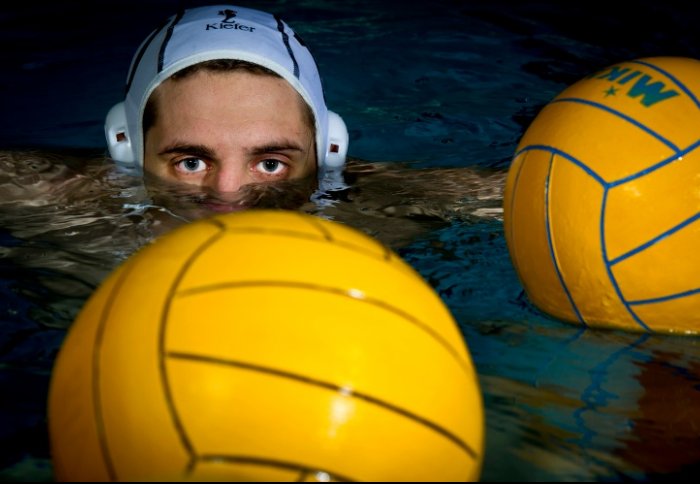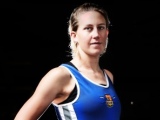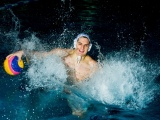Eyes on the prize

Imperial students Melanie Wilson and Adam Scholefield speak about their rigorous training and the final push to earn a place in the Olympic Games.
In July 10,500 Olympic athletes from around the world will arrive in London in peak condition. Their focus will be to perform at their very best after years of preparation. Hoping to be among them are two Imperial students — Melanie Wilson and Adam Scholefield. Reporter spoke to them about their rigorous training and the final push to earn a place in the Olympic Games.
Melanie Wilson, medical student and member of the GB rowing team
In March 2009 Melanie Wilson received two pieces of news – she’d got onto the GB rowing team and had been accepted to do a graduate entry medical degree at Imperial with a rowing scholarship. “I never thought either of those things would happen!” she says. Although the GB team wanted Melanie to train full-time she was keen to start her course at the College that October and train with former Head Coach at the Imperial Boat Club Steve Trapmore, who won gold in Sydney in 2000.
“Training at the Boat Club is amazing,” enthuses Melanie. “We have some excellent coaches and athletes and they’ve all been so supportive of my training.” Despite the opportunities as a rower at Imperial, Melanie found juggling her passions hard. She attended weekend training sessions and camps with the GB team and made it to the World Championships in 2010 as a reserve, but unable to give her sporting pursuits her full attention, she wasn’t selected to race. Melanie knew that if she was going to have a shot at the Olympics she’d need to dedicate herself to rowing so she put her studies on hold.
Melanie hopes to be chosen to row in the quad scull (a boat with four people with two oars each) in the Olympics and has another trial coming up in mid-March. “It’s so competitive at the moment as everyone wants to get chosen for the boats but, despite that, there is a really good team spirit,” she says. “It’s really important to get to know and understand each other as it helps you to work better on the water.”
Melanie lives in Mortlake and commutes six days a week to train with the GB rowing team at the Olympic Centre just outside Reading. On Sundays she joins the Imperial teams at the Boat Club. “To train for the Olympics you have to have exceptional motivation levels and be incredibly competitive and robust to handle the pressure,” says Imperial’s Head of Sport Neil Mosley. “We are incredibly proud of our students and excited they might have a chance to make it to the Games,” he adds.
A typical day of training starts at 7.30, and the team uses the adrenalin-fuelled music of Beyoncé to spur them on through 100 minutes on the rowing machine. Having burned around 1,500 calories they refuel with a cooked breakfast and a rest. After the break, the team head to the river to practise with their individual coaches for another couple of hours. “ Normally the coach makes me work on a specific technique,” says Melanie. “For example, when you race you slide forward and then put your blade in the water, so he might tell me to do that a bit quicker or put my body in a different position,” she explains.
Melanie describes the sound during a race when everything is going to plan: “When you have got a good rhythm going and all you can hear is the carbon oars lightly hitting the water, you can really relax into it.”
It’s undoubtedly hard work but Melanie is motivated by the memory of her team missing their goal in the 2011 World Championships. “We messed up one of our races and it was the biggest disappointment I’ve ever had in my life. Since then I’ve been finding it much easier to train because I think whatever happens this summer, I’ll kick myself if I didn’t try everything that I could, to be as good as I can be. It really is amazing to have the opportunity to try and be the best in the world at something.”
Melanie finds it reassuring to know that beyond the Olympics she still has something to look forward to in September when she returns to the third year of her medical degree at Imperial. “I really love studying and when the Olympics are over, I want to finish off my degree and become a doctor for the rest of my life. My plans definitely help to give me perspective when it gets stressful.”
Adam Scholefield engineering PhD student and Vice-Captain of the GB Water Polo team
Adam first took part in a game of water polo on his 10th birthday and was immediately hooked. The team sport, water polo, involves passing a ball down the pool to score goals and for Adam the competition was addictive. “I remember I hated getting out of the pool and I couldn’t wait for the next session,” he recalls. As his sporting skills improved, he moved from competing at local level to playing for Rotherham, one of the top water polo clubs in the UK, and was invited onto the GB team at the age of 17. Adam joined Imperial in 2003 to begin a four-year undergraduate course in Electrical Engineering, gaining a scholarship that allowed him to continue his water polo training alongside his undergraduate degree. After graduating, he moved up to Manchester to join the GB team but continued his studies at the College, commuting once a week to Imperial to work on his PhD in image processing. Since early 2011, like Melanie, he has interrupted his studies to focus on the Olympics, but he has regular Skype meetings with his supervisor at Imperial and, when he has time, he returns to London to work on his research.
Adam joined Imperial in 2003 to begin a four-year undergraduate course in Electrical Engineering, gaining a scholarship that allowed him to continue his water polo training alongside his undergraduate degree. After graduating, he moved up to Manchester to join the GB team but continued his studies at the College, commuting once a week to Imperial to work on his PhD in image processing. Since early 2011, like Melanie, he has interrupted his studies to focus on the Olympics, but he has regular Skype meetings with his supervisor at Imperial and, when he has time, he returns to London to work on his research.
The Olympic water polo team won’t be picked until days before the Games but Adam is quietly confident. “As long as I stay fit and don’t get any injuries I should have a good chance,” he says. Adam trains for two two- hour sessions in the pool every day, concentrating on shooting, tactics, passing the ball and legwork. In addition, the team does weight training in the gym two to four times every week.” When asked what he does to relax he laughs and says: “My PhD!”
On the day of a water polo game the team starts mentally preparing several hours before, going over their tactics. “I definitely think the logical thinking I developed during my degree helps me recognise what other teams are planning,” says Adam.
In training for the Olympics, athletes can feel disconnected from friends and family. Both students have tales of missing weddings, birthday celebrations or meeting newborn relatives, as well as everyday sacrifices such as declining friends’ invitations to the pub due to training commitments. “Sometimes it is really hard for people to understand,” says Adam. “To train every day you have to be motivated by getting to the highest level – it’s something I’ve always wanted to do,” he says.
After the Olympics, Adam is keen to finish his PhD and he is convinced that the focus he’s developed through training will help him in his career. “Being in the water for four hours a day might sound a lot but professional sport teaches you to get the best out of every opportunity. I hope to translate that ethos into my studies.”
Taking part in the Olympics in London will be unlike anything either of the students has ever experienced. “The support we’ve had so far has been insane,” says Melanie, “Over the next five months I’m going to put everything into my training – I know I’ll never have an opportunity like this again.”
Article text (excluding photos or graphics) © Imperial College London.
Photos and graphics subject to third party copyright used with permission or © Imperial College London.
Reporter
Press Office
Communications and Public Affairs
- Email: press.office@imperial.ac.uk
